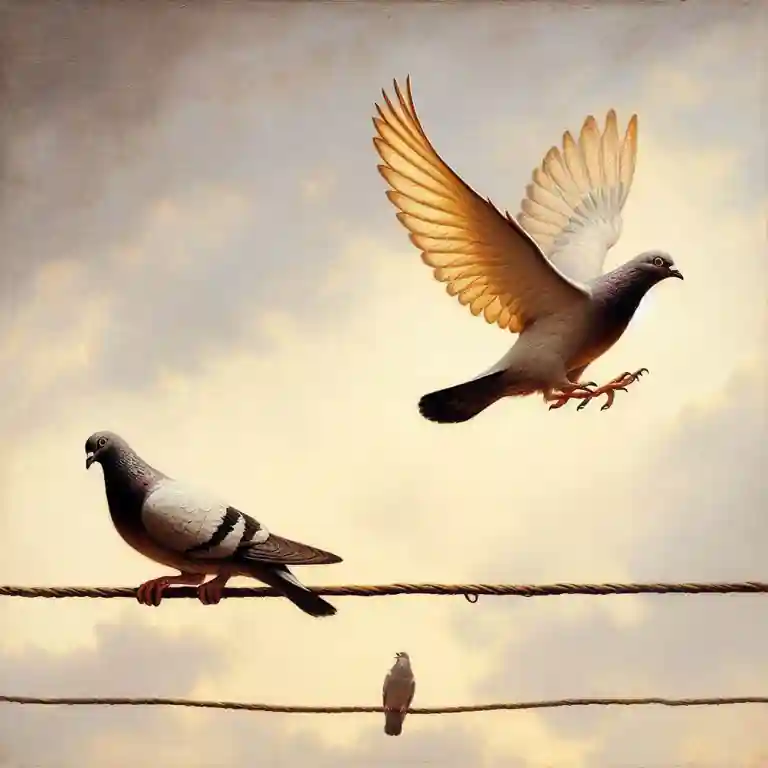
Saurabh shut the book down on the tea table. He was surprised to see the hands of the clock were still marking 5:40 p.m. He let out a sigh. Time dragged along like a sloth. He got up from the couch, stretched his fingers, yawned, then strolled leisurely across the hall for a few minutes before he moved to the balcony, in the back of his apartment. The view from his balcony couldn’t be considered a great view. Down below was a narrow street, a very narrow street, an alley really. It was too narrow for most vehicles. Opposite stood an old building. Standing there, all Saurabh could see was a huge, damp wall that had turned yellow over time with plaster peeling away in places. There was a window right across from his balcony which was always closed, but strangely today, it was wide open. An old man with copper-rimmed glasses and a cabbie cap was leaning out on his elbows, staring down at the empty street.
Despite being in different buildings, the men were so close to each other that it seemed that if Saurabh leaned a little, they could easily shake hands.
“Good evening, sir,” said Saurabh, attempting to initiate conversation. He was bored of the slow passage of time and the novel which was about the fall of a family with a dull plot. He had been reading since morning and only read a quarter of the pages.
“Evening.” The old man looked up and replied in a voice that hardly came out of his throat. His suntanned face was crisscrossed with uncountable wrinkles. Then he dropped his head low to peep into the right side of the street, not showing any interest in Saurabh.
“Are you waiting for the food van, sir?” Saurabh asked him after a pause.
“No,” the old man said, then cleared his throat and spat. “Just taking in some fresh air.”
Saurabh laughed. He took it as a rather sarcastic statement in contrast to the adverse situation they were collectively facing as a nation and a race. The news channels claimed the last time something like this happened it was called the Black Death in fourteenth-century Europe.
“I don’t think the air is fresh anymore,” Saurabh told the old man.
“What you think doesn’t matter,” the old man said cynically. “Look at them!” He pointed with his shaking finger at the pigeons perched one by one on the electric wires. “They don’t care.”
Saurabh, instead, looked down and shifted his gaze from right to left and then back again. The narrow street was covered with thousands of dead mango and neem leaves. And there were old stray dogs yawning while sitting on the top of dusty vehicles parked down there. Once too noisy, now the street was so silent that Saurabh could even hear the clock ticking behind him in the living room.
“Never in the last six years have I seen this road like this,” Saurabh said dismally as he was somewhat annoyed by the silence and the emptiness. For as long as he could remember, the street had always been occupied with scooters honking horns, children running behind sugar candy sellers, and people hooting and selling fruits and vegetables on their pushcarts. It was irritating sometimes, but now he could say it all had kept the street alive.
“I haven’t seen this many pigeons here together in the last twenty years,” the old man said.
More Stories:
“You’ve been living here for twenty years?” Saurabh asked, observing the man’s face. Certainly, he had never seen that old face before in this neighborhood. But then, he realized he had never truly paid attention to any of his neighbors. It was just the complete absence of work and the resulting boredom that drove him into this seemingly one-sided talk.
“Of course I live here, child. I am old. I have been old for the past twenty years. Where do you want me to go at this age?”
“I didn’t mean that. I wonder if you live here by yourself.”
“Yeah. A man of eighty-two can easily live on his own.” After an awkward pause, the old man continued. “I am an artist, and an artist must live alone, regardless of what others feel about it.” A long-lost sense of pride came back and his face seemed to glow for a moment as he declared himself an artist.
“Great! What do you paint, sir?” Saurabh grinned.
“I may look so boring to you, but I have made some amusing paintings.”
“Are you working on something interesting right now?”
“I painted my last piece seven years ago before my wife died.”
“Oh, I am so sorry. I’d love to see your collection someday. I appreciate good paintings.”
“I’ll show you something when I am ready. The younger generation doesn’t like to wait, but pardon me, child, these pigeons never really come here over and over again.”
For a moment, Saurabh considered the pigeons. Sitting there, they too looked bored of their own monotonous life. Does having wings make any difference at all? He wondered. As he looked at them, a few spread out their wings in order to fly. The sudden flutter of their wings jerked the wires and the rest of the birds, holding onto the wires, swung together up and down. As some more commenced to fly, the old man held his hand above his eyes and looked up in the sky where the pigeons were going. They collectively made a huge circle in the clear sky and disappeared behind a distant building. The old eyes became upset when they couldn’t see them anymore.
“In case you’re waiting for the van,” Saurabh said after a short uncomfortable pause. “I must tell you, it comes at six o’clock. Do you need anything, sir?”
“No. Yesterday I got all the stuff I needed… for the whole two weeks… I need nothing now.” The old man proudly smiled but didn’t look into Saurabh’s eyes. “Thank you for asking, though.”
They both stood there, Saurabh looking down at the street and the old man staring at the remaining pigeons. Saurabh took out a packet of cigarettes from his pajamas. The old man observed him when he lit a cigarette, then looked back inside his darkened room.
“Does the van bring this too?” the old man asked.
“No, sir. The van only brings packaged food, milk, and groceries. But I have a stock. I don’t know why. Maybe I’ve been collecting them for such an opportunity,” he laughed ironically.
The old man didn’t laugh at his joke but looked with longing at the cigarette pressed between Saurabh’s lips.
“You can have one if you want. Take it, sir.” Saurabh offered.
“Oh, no, child…I don’t usually… oh, okay… just one. Give me one if you are forcing me.”
More Stories:
Saurabh threw a cigarette across the space, then the lighter. The old man failed to catch both, but he picked them up off the floor. It took him a while to light the cigarette, then he tossed the lighter back and Saurabh grabbed it.
“What do you do?” the old man asked, after blowing the smoke out into the air.
“A software engineer,” Saurabh said. as he also blew smoke out of his mouth.
“Oh. That’s sad.”
“It’s sad, yes. That’s why I’m sitting here at home. The company promised to pay half our salary, but I’ve received nothing in the last five months. Thanks to my father who taught me the necessity of saving money at a very early age, I had some saved. But it’s not all about money. I want to work. Staying home for the whole day drives a man crazy. I think I should have been a doctor. They are the only ones busy now.”
“A noble thought,” the old man said. “They are really busy nowadays. I read it in the newspaper a few days ago.”
“While studying, I dreamt of becoming a doctor and moving out of the country,” Saurabh reflected. “Maybe even going to the USA someday like many other Indian doctors. Now I think it was a stupid idea.”
“Why?”
“Don’t you watch the news, sir? The situation seems out of control there.”
“Worse than here?”
“Yeah, much worse. Just like hell.”
“And, in Atlanta?” The old man was anxious as he pronounced Atlanta and stared into Saurabh’s eyes as if searching for a genuine answer. He had forgotten about everything, even about the pigeons.
“Oh, worse!”
“Oh, someone of mine lives there.” The old man shook his head.
“May I ask who?” Saurabh asked.
The old man said nothing, only took a puff and slowly released the smoke from between his parched lips. His fingers, holding the cigarette tightly, were shivering. But his eyes were calm now. One could say, it made him feel good to watch the smoke go up in the sky where the pigeons had gone, as if he was flying around them.
“You live alone here, child?” the old man asked.
“Ah… yes. I do. A young man can also live on his own.”
“Ha-ha. Are you married?”
“I was once.”
“Any children?”
“Thankfully no.”
“Where do your parents live?”
“That’s a difficult question. My mother died when I was a baby.”
“I’m sorry for that, and what about your father?”
“Sadly, he also passed away a few years ago. From a heart attack.”
“I am so sorry. I thought otherwise…”
“It’s okay. Had he been alive, I wouldn’t leave him alone but would keep him here with me. He was the best father in the world.”
“But you couldn’t smoke like this in front of him. I never let my sons smoke or drink as long as I was in the house.” The old man mocked and gave a clever smile. “Do you ever think of him?” he asked Saurabh as if taunting.
“What?”
“Don’t you miss your father?”
“You have to forget things and move on.”
“Right, child. Forgetting and moving on…yes…we all do that. You wouldn’t believe it, I’ve almost forgotten my father’s face, except for his thick eyebrows and trimmed beard.” He threw the cigarette butt out as far as he could with all the strength left in his eighty-two-year-old hand. “Once,” he continued, without matching eyes with Saurabh, “when I was young, and my mother wasn’t home for some reason, my father taught me how to cook a delicious omelet. That’s all he knew to cook in order to feed both of us. I’ve never forgotten his lessons. He was indeed a good teacher.”
“My dad was different,” Saurabh said as he took the last puff and let the butt slip from the grip of his fingers and watched it fall down to the street. “He always wanted me to settle down in a city and become something… something big. I don’t know what he meant by “big.” Then one day I received a call that…”
“Every father in this world thinks the same,” the old man said and took off his glasses and wiped them clean on his chest. After putting them back on, he continued, “Forgetting the past… moving on. But I chose to stay close to my father till his last breath. I quit my job. You know what his last words were? ‘It’s a great feeling when you die in your son’s lap.’ That’s what he said.”
Saurabh couldn’t take his eyes off the old man’s face as complex emotions crossed it. Of course, the old man was hiding an ancient pain behind his worn-out skin, but there was more, something horrible. Saurabh shifted his gaze to the right; now there were more people peeping out of their balconies and windows.
“I don’t think the van will come today,” guessed Saurabh.
More Stories:
“Probably not,” the old man agreed. He looked at the pigeons. The last of them began to fly away, except for one, a big, round pigeon that seemed too old to fly immediately. The old man moved uneasily and settled in his previous position.
“I don’t want to embarrass you by asking over and over,” Saurabh said. “But as you know, it is really a hard time for us, for our country, and for the entire world. In this time of crisis, we must help one another.”
“That makes you a good human.”
“Right, sir. So, do you need anything?” Saurabh asked, then waited for his reply.
“As I told you…” The old man looked back into his room, then down at his foot, and turned his head up. The copper rim of his glasses shone in the evening sun. “I bought all the stuff I needed yesterday.” He looked down at his nervous hands and then up at the lone pigeon. “I got everything, but eggs. You just reminded me of my father, and I wish I could cook some eggs today. Do you… do you have any eggs?”
Saurabh smiled and immediately went inside and brought out a whole tray of eggs, then leaned as far as he could over the railing to hand it to the old man.
“Thank you.” The proud old man tried hard not to make eye contact with him when he took the tray from the outstretched hand.
“Welcome,” Saurabh said. “You can call me anytime if you need something.”
“I bought everything I needed, but forgot the eggs!” The old man laughed forcefully. This time there was no pride in his smile, but an inkling of shame and hesitation that he wished to hide. He looked down at the tray.
“I want to see your paintings, sir,” Saurabh said, seeing the old man was ashamed of holding the tray.
“Of course,” the old man replied. “But, I think now I need to paint something new. The young won’t like the old stuff.”
“Wonderful idea! It would be a good start. What do you want to paint?”
“Maybe these pigeons when they come back.”
“That’s a great idea.”
“Thank you for the eggs, my son.” The old man waddled inside slowly, looking down at the tray of eggs, to put them somewhere safely. He left the window open, maybe it was unintentional. Saurabh knew the old man was not being honest from the very beginning. The van didn’t come to their street yesterday. But now the old man was happy to have some eggs.
“Sir!” Saurabh called out loudly. “Look! One pigeon is coming back.”
Divyank J, a 28 years old writer from Udaipur, India writes for Indian Review


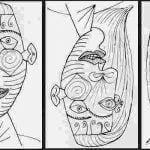
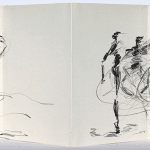
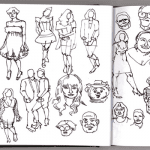
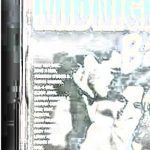
Leave a Reply